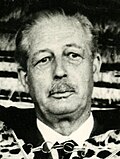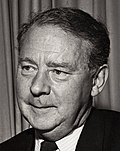| |||||||||||||||||||||||||||||||||||||||||||||||||
All 511 English seats in the House of Commons 256 seats needed for English majority | |||||||||||||||||||||||||||||||||||||||||||||||||
|---|---|---|---|---|---|---|---|---|---|---|---|---|---|---|---|---|---|---|---|---|---|---|---|---|---|---|---|---|---|---|---|---|---|---|---|---|---|---|---|---|---|---|---|---|---|---|---|---|---|
| |||||||||||||||||||||||||||||||||||||||||||||||||
The 1959 United Kingdom general election was held on Thursday, 8 October 1959. As in the nation, in England, the Conservative Party registered a landslide victory over the Labour Party and its third consecutive victory overall.
The victory of the Conservative Party in England was even more remarkable than in the nation as it won over 120 more seats than Labour with just over 50% of the voteshare. It was the only election between 1945 and 1979 in which a party won over 300 seats in England.
It was also the best performance of the Conservative Party in England since 1935 and conversely the worst for the Labour Party in England since 1935. [1] [2] Also, these elections marked the last time when the Conservative Party won over 50 per cent voteshare in England.


